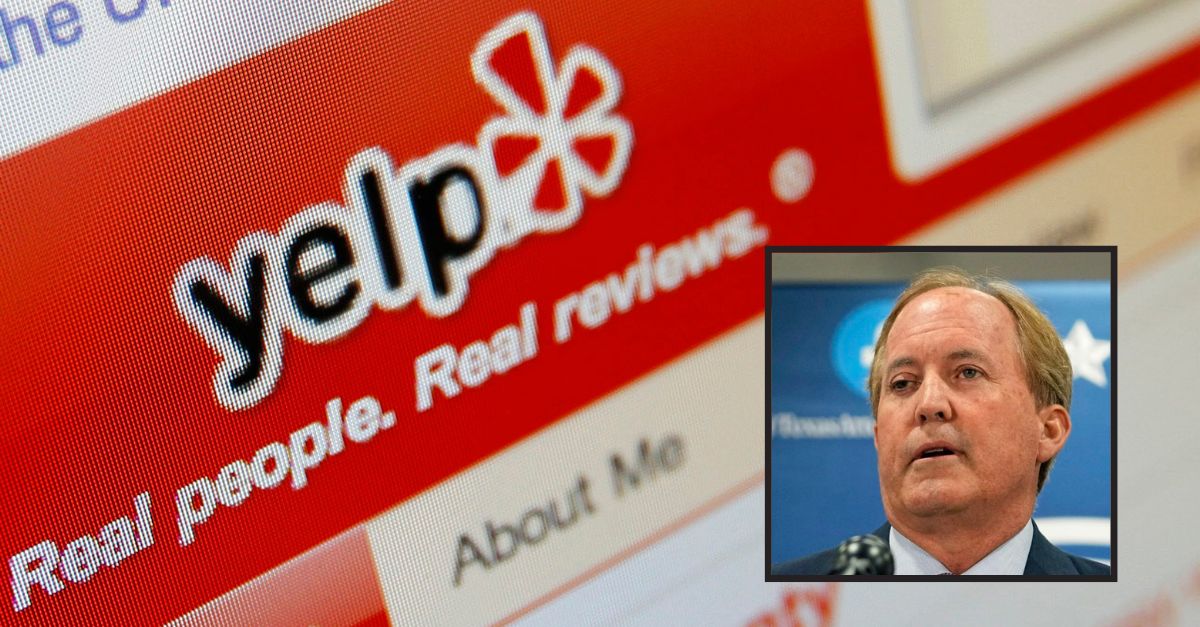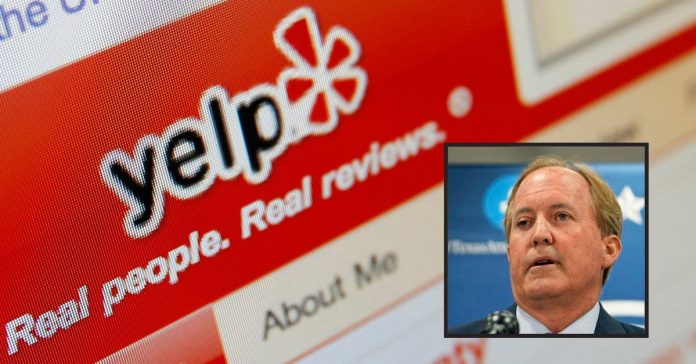
FILE – The Yelp website is shown on a computer screen in Los Angeles, March 17, 2010. (AP Photo/Richard Vogel, File). Inset: Texas state Attorney General Ken Paxton makes a statement at his office in Austin, Texas, on May 26, 2023. (AP Photo/Eric Gay, File)
Counsel for embattled Texas Attorney General Ken Paxton squared off in court Tuesday against lawyers for the website Yelp over online disclaimers warning women that “crisis pregnancy centers” may not be what they seem.
Paxton and Yelp, a website for reviews and information about local businesses, are engaged in two lawsuits — one in state court, the other in federal court — over what the anti-abortion attorney general has called “false and misleading disclaimers” on listings for “crisis pregnancy centers.”
There is a long history of “crisis pregnancy centers” or “CPCs” operating around the country, often in close proximity to health centers that offer abortion services. As Law&Crime previously reported, many CPCs use names that are intentionally similar to the clinics, and CPC workers counsel women against abortion if they mistakenly enter the space. Many of these establishments offer no healthcare at all, and are not licensed medical facilities. CPCs are also known for providing false or misleading information about abortion in an effort to dissuade individuals from terminating their pregnancies.
From August 2022 to February 2023, Yelp included a disclaimer on all CPCs that informed users that these centers “typically provide limited medical services and may not have licensed medical professionals onsite.”
Paxton took issue with what he said called the “false” disclaimer. According to Paxton, “Pregnancy resource centers provide significant care and counseling to pregnant women.” Paxton denounced Yelp’s disclaimers as “thinly veiled attempts to discriminate against the centers” that might steer “millions” of women and families away from their beneficial services.
Yelp amended the disclaimer in February 2023 to read, “This is a Crisis Pregnancy Center. Crisis Pregnancy Centers do not offer abortions or referrals to abortion providers.”
Yelp filed a preemptive lawsuit September 27, 2023 in response to statements made by Paxton that suggested he planned to take legal action against the company for its disclaimers about CPCs. In the filing, the company sought injunctive and declaratory relief that would prohibit Paxton from “punishing Plaintiff Yelp … for publishing truthful information about businesses that offer pregnancy-related counseling to the public.”
The next day, Paxton sued Yelp for deceptive business practices in Texas state court and requested $10,000 per violation and a permanent injunction against the company to curb its “disparate treatment” of CPCs.
U.S. District Judge Trina Thompson, a Joe Biden appointee, presided over the oral arguments Tuesday. Yelp attorney Ambika Kumar argued that the company’s disclaimer was protected as truthful, noncommercial speech. Kumar also argued Paxton was exceeding his authority as a state official by attempting to enforce “Texas-style abortion restrictions” outside Texas.
“I think the attorney general has made it clear that he wants to project his personal views on abortion into other states,” Kumar told the court. “He sent a letter to a California-based company, demanding that that California-based company censor its own speech to California consumers.”
Ryan Baasch argued on behalf of the state of Texas and denied that Paxton was attempting to silence a particular viewpoint. Rather, Baasch contended in his argument to dismiss Yelp’s case, Paxton was simply attempting to protect Texas consumers from being misled.
Yelp’s attorney pushed back on the claim, noting that no evidence had been presented of any consumer who was actually misled and calling Paxton’s position “patently bad faith.”
In 2018, the U.S. Supreme Court struck down a California statute aimed at the potential problem posed by crisis pregnancy centers. The law required nonprofits licensed to provide medical services — such as pregnancy tests and ultrasound examinations — to notify patients that free or low-cost abortions are available and to provide the telephone number of the state agency that can put the patients in touch with providers of those abortions.
The law also required unlicensed CPCs to include disclaimers in their advertisements that their services do not include medical help.
A ruling in Yelp v. Paxton is expected in the coming weeks.
Editor’s note: This piece was updated from its original version to correct the date of Yelp’s lawsuit against Paxton. An earlier version incorrectly indicated that Paxton’s lawsuit had been filed first.
Have a tip we should know? [email protected]

